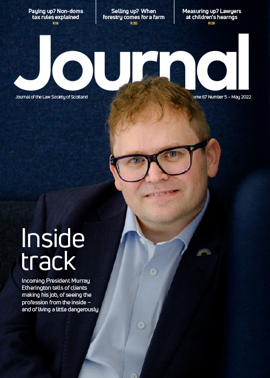Arbitration: Delivering together

"The right... to apply or not to apply the arbitration clause in its discretion never was the right of the court in Scotland. If the parties have contracted to arbitrate, to arbitration they must go." These words from Lord Dunedin in a 1922 judgment summarise arbitration in Scotland as perfectly now as they did when they were delivered.
All solicitors in Scotland have a duty to be aware of, and advise clients of, the ADR (alternative dispute resolution) options available to them. It is because of this, in the year that Scotland welcomes the ICCA (International Council for Commercial Arbitration) Congress – in Edinburgh from 18-21 September – and after two years of unprecedented pressure on our court system, that the Law Society of Scotland is working to highlight the use of ADR, including arbitration, mediation and adjudication, to our members.
The Arbitration (Scotland) Act 2010 means that Scotland has one of the most modern arbitration systems in the world. It is important that practitioners are able to utilise this where appropriate, and that Scotland as a jurisdiction positions itself as a venue for ADR, domestically and internationally. Arbitration, and other forms of ADR, can be a flexible alternative, and in Scotland it offers a confidential process, appealing to many. It has also been relatively quick to respond to the post-COVID world, with the introduction of virtual hearings and bespoke IT systems. It is used in more areas than you may think (although adjudication remains key in construction disputes). However, it is still underutilised and there is potential for further knowledge, use and increased reputation.
Support for members
Key to promoting arbitration under Scots law, increasing the number of arbitrations and appointments, and Scotland as a seat, is knowledge and interest from the profession here in Scotland.
Engagement in ADR and arbitration, along with domestic and international opportunities, has certainly increased with the promotion of ICCA and the many related events, and it is hoped that local solicitors will harness this for their practice and embrace the opportunities. The Society and other organisations must also capitalise on being at the centre of the arbitration world this autumn and what it can do for our jurisdiction.
We want to support our members in realising the opportunities, and so we are collaborating with the Chartered Institute of Arbitrators (“CIArb”) to help promote the use of arbitration and other forms of ADR. We believe that one of the best ways in which we can promote its use, and raise awareness, is to provide high quality training to enable aspiring professionals to acquire the necessary skills and knowledge in this field.
CIArb offers recognised training to aspiring and established ADR professionals. It has a global network with a membership of more than 17,000 professionals operating in 150 jurisdictions through 42 branches.
Alongside this, the Society offers accredited specialisms in both arbitration law and as an approved solicitor arbitrator. Our accreditations recognise solicitors who develop specialist knowledge; they also help the public choose a solicitor with the necessary expertise, particularly in more complex cases. Accreditation acts as a hallmark of expertise that clients can trust, increasing your potential for fees and referrals and strengthening profiles.
Specialism opportunities
Brandon Malone, chair of the Society’s accreditation panel, elaborates: "To qualify as an accredited specialist in arbitration, solicitors must demonstrate experience in and knowledge of arbitration. We recognise that there is not yet a huge amount of arbitration in Scotland, so we are sympathetic to applicants who can demonstrate experience in other forms of adjudicative alternative dispute resolution, such as expert determination and adjudication. Those solicitors who qualify for accredited specialist status are then eligible to apply to become an accredited solicitor arbitrator. Solicitor arbitrators are members of the Society’s Arbitral Appointment Referee Arbitrators Panel and are eligible to be appointed as arbitrator by the Society. The President of the Society is often named as the appointing body in commercial contracts, and regularly appoints arbitrators.
"To be eligible for solicitor arbitrator status, accredited specialists can either demonstrate their experience by providing two (anonymised) awards that they have issued, or by demonstrating that they have passed the CIArb exams in award writing and have obtained Fellow (FCIArb) status."
The two professional bodies are therefore delighted that, between us, we provide a range of training, qualifications and accreditations from entry level learning opportunities through to CIArb diplomas and on to specialist accreditation by the Society, giving practitioners here in Scotland opportunities to get involved and further their skills at all levels.
Malone, who is also ICCA 2022 chair, adds: "An estimated 1,000 arbitration lawyers will converge on the Edinburgh International Conference Centre for the XXVth ICCA Congress, and the eyes of the arbitration world will be on Scotland. It is therefore an excellent time to get involved in Scottish arbitration."
Find out more information on ADR by visiting the Society’s website.







